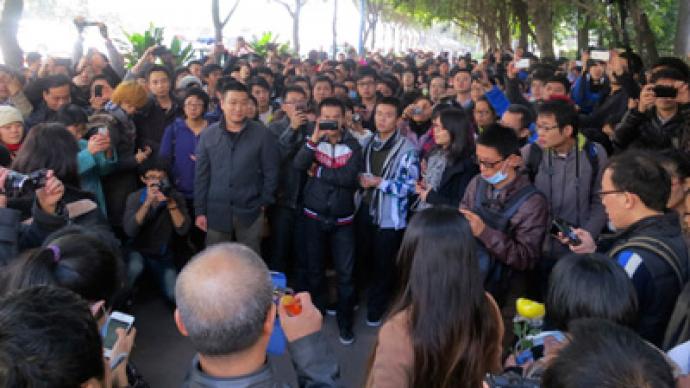China censorship row escalates to rare street protest

A quite unprecedented event has hit the Chinese southern city of Guangzhou: Hundreds of people gathered outside the office of a liberal newspaper after a leading New Year article calling for more press freedom was deleted from the daily’s website.
“We want press freedom, constitutionalism and democracy,” read one of the banners at the protests outside the headquarters of Southern Weekly. Monday demonstration in the capital of Guangdong province was mostly reported via social networks.
The protest appears to have captivated the attention of the country with celebrities, public figures and journalists voicing their support for the cause.
The Chinese version of Twitter, Weibo was swamped by floods of messages of solidarity.
“A black hand closes heavy, black curtain, blocking brightness and fresh air as there is no weekend any more in the south,” wrote journalist Wang Keqin.
Additionally, Yao Chen, an award-winning Chinese actress with the most followers on the Chinese social network quoted Russian writer Alexandr Solzhenitsyn: “One word of truth shall outweigh the whole world.”
In an effort to allay tensions, a Communist Party chief from Guangdong province has sought to reach a deal in the censorship standoff with the Chinese newspaper. A Reuters source said the party chief, Hu Chunhua, proposed a solution that led to some of the publication’s staff striking.
Under the proposed deal the newspaper would resume work as normal and the majority of staff would not be punished. Sources from within the publication said they would be returning to work as authorities had agreed to “lengthen the leash” on the Southern Weekly.
In an open letter, the newspaper staff and interns called for the resignation of Tuo Zhen, a provincial propaganda official who is thought to be behind the article’s removal. The editorial piece calling for guaranteed constitutional rights was changed for one reflecting the general positions of the ruling Communist Party.Senior editors also claimed the new article, viewed as “weak” by the staff, was “written by the newspaper editors.” The protesters said this was never true.Calls for Tuo Zhen’s resignation were echoed by prominent Chinese academics from across the country who signed a similar letter the previous week.In China, all national and local media are subject to government propaganda department scrutiny especially when they want to touch upon issues of democracy, corruption, separatism or government’s mistakes. Pieces perceived as “counter-revolutionary” are often suppressed, but Agence France Presse remarks the deleted editorial in the Southern Weekly was nothing outstanding in this regard as more critical articles have frequently made it to readers.The row comes just after the pledges from the new Communist leadership which promised a more open ruling style during the party congress in November.
Meanwhile, Greatfire.org, which monitors censorship in China, has reported that Google has dropped its censorship search warning coined specially for Chinese web-users. Google search pages highlighted terms that were likely to trigger China's "Great Firewall" to censor the results. But the Google says the service and the page explaining the tool were turned off some time between December 5 and December 8. The reasons remain unclear as the company put considerable effort into keeping the tool alive when Chinese government blocked the file and later blocked the address of the web page.Google China dropped self-censorship in 2010 saying it was a response to a Beijing-sponsored hacking attack on their website. The company said if the pressure continued they were ready to exit the market altogether. However, Google’s published financial targets this year reveal the company is still intent on growing its five per cent share of the Chinese search market.














